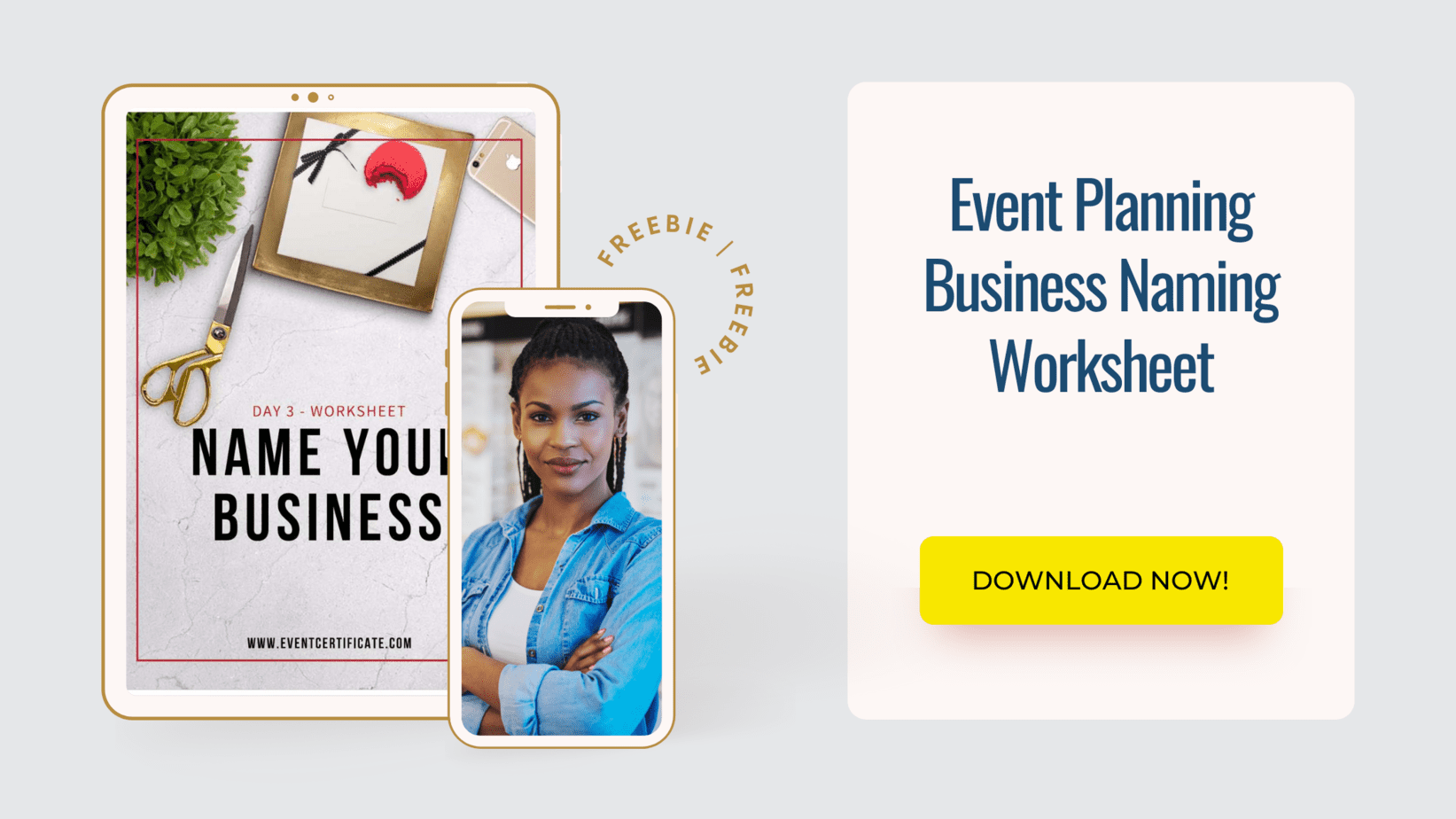Are you considering starting a wedding or event planning business but unsure of how to get started? Our event planning business startup checklist will provide a clear and simple guide for starting and launching your event planning business.
This checklist is applicable to event planners, wedding planners, and even party planners. Combining years of experience from multiple event planners on the steps that helped them to launch their businesses successfully.
Let’s explore your next steps.
How Can I Start An Event Planning Business?
According to Allied Market Research, the global events industry market was valued at $1,135.4 billion in 2019, and is projected to reach $2,046.7 billion by 2032. Our business startup checklist will guide you through every step needed to launch a successful, profitable event planning business.
These tips also apply if you’re starting an “event management” company— since both phrases are often used interchangeably. Still, the goal is the same: building a thriving business that showcases your expertise.
Business Startup Checklist
Are you in a rush? Download a copy of the business startup checklist in a PDF format below.

ESSENTIAL FIRST STEPS
1. Research your Market
Deciding you’re ready to start a business is great, but you’ll have to think about if this business is viable. Is there a demand for event planners and wedding planners in your city? Is your area currently flooded with event and wedding planners? For Example, if you’re a Kansas City Wedding Planner, it’s worth exploring how many wedding planners there are in Kansas City, what type of events do they focus on, and what are your opportunities as a new planner entering the space.
And if you are in a saturated market, how will you stand out from the other planners? What makes your business unique? What’s your Niche?
This should be the main focus of your business startup checklist before you launch your business.
2. Create an Event Planning Business Plan
Once you’ve decided that your business is viable and you’ve figured out your niche, it’s time to write a business plan. A business plan will help you map out where you would like your business to be and how you plan to get there.
You can use an online program such as Enloop to help write your business plan. If you prefer written templates, you can an event planning business plan template and samples in our business plan guide.
3. Choose an Event Planning Business Name
You’ll notice that I did not make this #1 on the list and that was intentional. While choosing a business name is important, you can get completely stuck in this section. Your business name is not the most important thing when starting up, and if you’re ever unsure of what to use, just use your name until you decide on something more permanent.
If you need help on how to choose a business name, check out this event planning business name selection guide. This is a detailed worksheet that takes you step by step through a brain dump and creative session to choose the best name for your business.

LEGAL & FINANCIAL SETUP
4. Event Planner Legal Structure
Choosing a business structure should not be taken lightly. It’s important to explore the different business structures available to you before making a decision. You may choose to operate as a sole proprietor, partnership, or corporation. These will all have different legal and financial implications. For example, a sole proprietor is legally responsible for any damages incurred by the company, while liability is limited to just the company, and not the operator(s) if you’re incorporated.
What are the legal requirements for an event planning business? This will vary according to the type of services you’ll be providing, the type of events you’re planning, and your business location. I highly recommend speaking with a Lawyer and an Accountant before making any final decisions.
Here are some tips on how to find the Best Lawyer & Accountant for your business:
- How to Choose the Best Lawyer for Your Event Planning Business.
- Hiring an Accountant for your Event Planning Business.
5. Register your Business
Now that you’ve chosen your business structure, it’s time to register your business and obtain any necessary licenses. To ensure a smooth process, start by checking your local city website for information on how to search for available business names and complete the registration process. Don’t forget to also research and apply for any applicable business licenses in your location.
If you are unsure of where to start, a simple Google search such as “register a business in YOUR CITY NAME” will provide a ton of resources to help.
Also Check out: 3 Tips for Registering your Event Planning Business.
6. Open a Business Bank Account
While it is possible to operate your event planning business using your personal bank account, it’s not advisable. It’s much easier to track your business revenue and expenses separately by using a dedicated business bank account. This will be especially helpful at tax time, as it will make it much easier to accurately report your business income and expenses. Trust, the time and effort you put into setting up a separate business bank account will pay off in the long run.
You can also check with a financial services platform specifically for small businesses, such as Novo or Xendoo.
7. Setup an Accounting System
Whether you choose to use an Accountant or manage your business finances on your own, it’s important to have a system. Whether that’s tracking your expenses through a spreadsheet template or through a more comprehensive financial services team that can handle your books and taxes. The key here is to track your income and expenses. At any given time you should know your business’s financial situation.
If you ever want to be able to answer the question How Much Does It Cost To Start An Event Planning Business? Having a good accounting system in place is a must-have for tracking your start-up costs and profitability.

BRAND DEVELOPMENT
8. Select your Brand Colors
Now for the pretty stuff!
Branding is a crucial element of any business, as it helps to establish consistency and make your business more recognizable. A good place to start is by defining your brand colors. Choose colors that you like and that reflect the personality of your company. These colors will be used in your branding materials, such as your logo, website, business cards, and marketing collateral, so be sure to put some thought into your selection.
To help check out Canva’s 100 Color combinations for ideas.
9. Select your Branding Font
Once you’ve established your brand colors, it’s important to also choose branding fonts that will help keep your company’s image consistent and professional. A company that uses a different font in every ad or marketing piece is likely to be less memorable to potential customers. By choosing one or two fonts to use consistently in your branding materials, you can create a cohesive and recognizable image for your business
You can also use Canva to create your unique font combination.
10. Create a Business Logo
Your logo is a vital element of your brand and should accurately reflect your business. If you’re not a graphic designer, it’s a good idea to hire one to create your logo for you. A professional designer will be able to craft a visually appealing and effective logo that aligns with your brand and resonates with your target audience. Don’t try to tackle this task yourself unless you have the necessary skills and experience – a poorly designed logo can harm your business’s image and make a bad impression on potential customers.
Check out Fiverr where you can get amazing logo designs for as low as $5.
11. Order your Business Cards
I’ll be completely honest, this is an optional step. Depending on how clients are finding you and how much you’re networking, you might be able to hold off on the business cards, especially if you’re strapped for cash in the beginning.
If you choose to use business cards, check out Canva or VisaPrint. They allow you to create multiple designs and have them printed online for a very affordable price.
12. Your Business Templates
Having the back end of your business set up is just as important as the front end. From your brochures to your social media images, get your templates created and branded to your business guidelines.
These include:
- Brochures
- Proposals
- Contracts
- Email templates
- Services & Pricing guides
- Social media templates etc.
You can find pre-made business templates for event and wedding planners on EventPlanningTemplates.com.

ONLINE PRESENCE
13. Register a Domain Name
Once you’ve selected a business name it’s time to start securing your online business assets and the first one is a domain for your website. Try to get a domain name that matches your exact business name. If you’re not able to find a domain name with your business name, then choose the best next match.
For example: If your business name is “Destiny Events” try to secure “destinyevents.com”. If that is already taken, then go for something such as “DestinyEventsAtlanta” (provided you’re located in Atlanta!).
My recommended site for purchasing a domain is BlueHost. You can find domain names for as little as $0.99.
14. Set up a Website
Your website will be your online home for sharing your services, process, and portfolio with clients. Spend the time to create a website that will wow your potential clients and increase your chances of getting hired.
Knowing the best website platforms to use that are easy to edit and accessible is also key. Check out this list of the top website platforms that we recommend for Event Planners and Wedding Planners: Best Websites for Wedding Planners
If you’ve already created your website but are not getting leads, Contact us to get a free Website & SEO Audit to see how well you rank on a Google search.
15. Secure your Social Media Accounts
If you’re starting a new business, it’s important to secure your brand’s presence on social media platforms, even if you don’t plan on using them right away. This will help prevent someone else from using your business name on those platforms and potentially creating confusion. Additionally, as your business grows, you may change your mind about which social media platforms to use, so it’s good to have options available. Take the time to secure your business name on the major social media platforms to protect your brand and give yourself flexibility in the future.
We recommend starting your business on more visual social media platforms. As an event planner, you sell clients using visuals. Platforms such as Pinterest, Instagram, TikTok, and YouTube will help you to do just that.

BUSINESS OPERATIONS SETUP
16. Event Business Insurance
As a new event planner, it’s essential to protect your business with the right insurance coverage. The specific insurance needs for your business and each event may vary depending on the laws in your region. To ensure you have the protection you need, it’s a good idea to speak with a few insurance companies about business liability and event insurance options. This will help you make informed decisions about the coverage you need, especially in case of any unexpected client issues or incidents during an event.
17. Get to Know Your Vendors
Before you start planning paid events, it’s a good idea to get to know the various vendors in your area. Research local venues, caterers, florists, and other service providers and create a list of the ones whose work and products you admire. This will save you time and hassle once you begin working with clients, as you’ll already be familiar with some of the best vendors in your area and can make recommendations accordingly. Plus, having a strong network of reliable vendors is key to the success of any event planning business.
18. Client Relationship Management (CRM)
As you set up your business one of the best tools to help you manage proposals, invoices, payments and projects is a client relationship management system (CRM). There are several options available, but the ones that I recommend for wedding and event planner are HoneyBook (Get 50% Off of Honeybook here) and Aisle Planner.
Honeybook is the all-in-one platform that will help to keep you sane, when it feels like you have 101 items to track. I personally use HoneyBook in my business and it’s a game-changer for helping me and my clients stay organized and on the same page. But if you’re a wedding planner, Aisle Planner might offer you more wedding specific project management options.
Check out my video below on how to use HoneyBook as a Wedding Pro.
Also check out: Aisle Planner vs HoneyBook Review: An Insiders Guide
MARKETING & GROWTH
19. Build your Portfolio
Gathering high-quality images of past events is crucial for marketing your event planning business. If you haven’t already, start collecting all of your event photos to use in your marketing materials. If you don’t have a lot of event images yet, try looking back at past family events that you have planned, like birthday parties or holidays. Even if the events were small, they can still be used to showcase your planning skills and attention to detail. These images will become an important part of your website gallery and other marketing efforts, so be sure to put some thought into which ones you choose to use.
Don’t have any photos? Not to worry, you can plan a styled shoot or even a branding shoot to get some professional images, and you can also find free stock images on websites such as Unsplash.
PRO TIP: As you build your business there are many ways to gain experience. You can take on events for family and friends to get your "feet wet". But until you land your first paying client, you can also explore volunteering or shadowing event planners who are looking for assistant planners to help with their events.
20. Marketing your business
Once your business is up and running it’s time to market it to get more clients. This would not be a thorough business startup checklist if this was not included. You can do this through several different methods from signing up for Google Business Listing, Eventective, to Facebook Ads. You can even promote your business by hosting a launch party!
Promote your business and share it over and over again with your network. The more people know about your business the better.
The key here is to start with a marketing strategy in mind and hire a marketing professional if you need help.
Also check out: 100+ places to advertise your event planning business online
21. Hire Support
Once you’ve launched your business it’s time to think about if you need to hire help. This could be an event assistant, a virtual assistant, or a freelancer for one-off projects. The key here is not to try and do every single task in your business on your own. When I first started my business freelancers helped tremendously. From helping to create a logo or my intro video on YouTube. You pay them one time and they get the job done.
You can find a number of freelancers to provide different levels of support on platforms such as Upwork.
Just remember to delegate, delegate, and delegate some more. Especially if you’re a one-man/woman operation and if you also have another job.

FAQs
Frequently Asked Questions About Starting an Event Planning Business
How much money do I need to start an event planning business?
Initial startup costs typically range from $2,000-$5,000 for a home-based business, covering basic expenses like:
- CRM software: $300-600 annually
- Business registration: $100-500
- Website and hosting: $500-1,000
- Basic marketing materials: $500-1,000
- Insurance: $500-1,500 annually
Do I need a certification to become an event planner?
While certification isn’t legally required as an event planner or wedding planner, it can enhance your credibility and expertise. Popular certifications to explore include:
- Certified Wedding & Event Planner (CWEP)
- Certified Meeting Professional (CMP)
- Certified Special Events Professional (CSEP)
What percentage do event planners typically charge?
Event planners typically charge using different models from a Flat Fee, Percentage, Hourly Rate, and even a monthly retainer. You can find a full pricing roadmap and calculator in our Event Planner Pricing Guide.
Can I start an event planning business from home or while working full-time?
Yes, many successful event planners started their business part-time or from home while juggling family commitments. It all comes down to focusing on events that match your schedule, such as weekend events, building your portfolio gradually and utilizing tools and resources to help save time.
FIND A MENTOR: Business Startup Checklist Recommendation
One of my biggest business regrets and many of my team members echo this sentiment, is not seeking help sooner in their business. I’m someone who can learn by doing and I did exactly that when I started my business. I jumped in and tried to do everything myself. Unfortunately, this meant that I worked a lot longer and harder at certain tasks than I should have. I could have shortcut the process by seeking someone who had been there before me and was willing to share their knowledge and expertise. Honestly, I could have saved so much time and money, had I just learned to seek out training or a mentor as I needed it.
Check out my top recommended marketing program for event planners.





Comments are closed.